这是我在学习搭建webserver时的笔记。此开源项目由C语言实现。
github开源项目链接:https://github.com/EZLippi/Tinyhttpd
建议参考:TinyHTTPd开源项目总结 - Caso_卡索 - 博客园 (cnblogs.com)
Tinyhttpd精读解析 - nengm - 博客园 (cnblogs.com)
HTTP服务器的本质:tinyhttpd源码分析及拓展 - 七夜的故事 - 博客园 (cnblogs.com)
这几个博客原理和代码讲得比较详细,有些遇到的问题可以参考着解决。
本人计算机小白,在搭建webserver之前建议小白先了解:HTTP协议、TCP协议、基本TCP套接字编程以及linux基本操作指令、vim的使用、如何makefile等等。
有几个需要注意的地方:
1、关于脚本实现的部分。
(1)测试CGI时需要本机安装PERL,同时安装perl-cgi。我的ubuntu系统自带perl,测试时报错:Can‘t locate CGI.pm in @INC (you may need to install the CGI module)
因此需要装perl-cgi模块,参考解决 Can‘t locate CGI.pm in @INC (you may need to install the CGI module)_胡鹄的博客-CSDN博客;
(2)需要修改htdocs文件夹下的.cgi代码首行路径为本机perl所在路径。在ubuntu终端可用指令which perl查看本机perl的路径。
2、关于makefile部分。
不需要按照原开源项目的makefile实现,可以只实现httpd,改成:
all: httpd httpd: httpd.c gcc -g -W -Wall -pthread -o httpd httpd.c clean: rm httpd
3、如何运行webserver
在ubuntu终端运行httpd程序,然后可在ubuntu系统的firefox浏览器中打开127.0.0.1:对应端口号。
下面是httpd.c的代码:
#include <stdio.h> #include <sys/socket.h> #include <sys/types.h> #include <netinet/in.h> #include <arpa/inet.h> #include <unistd.h> #include <ctype.h> #include <strings.h> #include <string.h> #include <sys/stat.h> #include <pthread.h> #include <sys/wait.h> #include <stdlib.h> #include <stdint.h> #define ISspace(x) isspace((int)(x)) #define SERVER_STRING "Server: jdbhttpd/0.1.0 " #define STDIN 0 #define STDOUT 1 #define STDERR 2 void accept_request(void *); void bad_request(int); void cat(int, FILE *); void cannot_execute(int); void error_die(const char *); void execute_cgi(int, const char *, const char *, const char *); int get_line(int, char *, int); void headers(int, const char *); void not_found(int); void serve_file(int, const char *); int startup(u_short *); void unimplemented(int); /**********************************************************************/ /* A request has caused a call to accept() on the server port to * return. Process the request appropriately. * Parameters: the socket connected to the client */ /**********************************************************************/ void accept_request(void *arg) { int client = (intptr_t)arg; char buf[1024]; size_t numchars; char method[255]; char url[255]; char path[512]; size_t i, j; struct stat st; int cgi = 0; /* becomes true if server decides this is a CGI * program */ char *query_string = NULL; numchars = get_line(client, buf, sizeof(buf)); i = 0; j = 0; while (!ISspace(buf[i]) && (i < sizeof(method) - 1)) { method[i] = buf[i]; i++; } j=i; method[i] = '�'; if (strcasecmp(method, "GET") && strcasecmp(method, "POST")) { unimplemented(client); return; } if (strcasecmp(method, "POST") == 0) cgi = 1; i = 0; while (ISspace(buf[j]) && (j < numchars)) j++; while (!ISspace(buf[j]) && (i < sizeof(url) - 1) && (j < numchars)) { url[i] = buf[j]; i++; j++; } url[i] = '�'; if (strcasecmp(method, "GET") == 0) //完善查询语句URL+资源位置 { query_string = url; while ((*query_string != '?') && (*query_string != '�')) query_string++; if (*query_string == '?') { cgi = 1; *query_string = '�'; query_string++; } } sprintf(path, "htdocs%s", url); if (path[strlen(path) - 1] == '/') strcat(path, "index.html"); if (stat(path, &st) == -1) { while ((numchars > 0) && strcmp(" ", buf)) /* read & discard headers */ numchars = get_line(client, buf, sizeof(buf)); not_found(client); } else { if ((st.st_mode & S_IFMT) == S_IFDIR) strcat(path, "/index.html"); if ((st.st_mode & S_IXUSR) || (st.st_mode & S_IXGRP) || (st.st_mode & S_IXOTH) ) cgi = 1; if (!cgi) serve_file(client, path); else execute_cgi(client, path, method, query_string); } close(client); } /**********************************************************************/ /* Inform the client that a request it has made has a problem. * Parameters: client socket */ /**********************************************************************/ void bad_request(int client) { char buf[1024]; sprintf(buf, "HTTP/1.0 400 BAD REQUEST "); send(client, buf, sizeof(buf), 0); sprintf(buf, "Content-type: text/html "); send(client, buf, sizeof(buf), 0); sprintf(buf, " "); send(client, buf, sizeof(buf), 0); sprintf(buf, "<P>Your browser sent a bad request, "); send(client, buf, sizeof(buf), 0); sprintf(buf, "such as a POST without a Content-Length. "); send(client, buf, sizeof(buf), 0); } /**********************************************************************/ /* Put the entire contents of a file out on a socket. This function * is named after the UNIX "cat" command, because it might have been * easier just to do something like pipe, fork, and exec("cat"). * Parameters: the client socket descriptor * FILE pointer for the file to cat */ /**********************************************************************/ void cat(int client, FILE *resource) { char buf[1024]; fgets(buf, sizeof(buf), resource); while (!feof(resource)) { send(client, buf, strlen(buf), 0); fgets(buf, sizeof(buf), resource); } } /**********************************************************************/ /* Inform the client that a CGI script could not be executed. * Parameter: the client socket descriptor. */ /**********************************************************************/ void cannot_execute(int client) { char buf[1024]; sprintf(buf, "HTTP/1.0 500 Internal Server Error "); send(client, buf, strlen(buf), 0); sprintf(buf, "Content-type: text/html "); send(client, buf, strlen(buf), 0); sprintf(buf, " "); send(client, buf, strlen(buf), 0); sprintf(buf, "<P>Error prohibited CGI execution. "); send(client, buf, strlen(buf), 0); } /**********************************************************************/ /* Print out an error message with perror() (for system errors; based * on value of errno, which indicates system call errors) and exit the * program indicating an error. */ /**********************************************************************/ void error_die(const char *sc) { perror(sc); exit(1); } /**********************************************************************/ /* Execute a CGI script. Will need to set environment variables as * appropriate. * Parameters: client socket descriptor * path to the CGI script */ /**********************************************************************/ void execute_cgi(int client, const char *path, const char *method, const char *query_string) { char buf[1024]; int cgi_output[2]; int cgi_input[2]; pid_t pid; int status; int i; char c; int numchars = 1; int content_length = -1; buf[0] = 'A'; buf[1] = '�'; if (strcasecmp(method, "GET") == 0) while ((numchars > 0) && strcmp(" ", buf)) /* read & discard headers */ numchars = get_line(client, buf, sizeof(buf)); else if (strcasecmp(method, "POST") == 0) /*POST*/ { numchars = get_line(client, buf, sizeof(buf)); while ((numchars > 0) && strcmp(" ", buf)) { buf[15] = '�'; if (strcasecmp(buf, "Content-Length:") == 0) content_length = atoi(&(buf[16])); numchars = get_line(client, buf, sizeof(buf)); } if (content_length == -1) { bad_request(client); return; } } else/*HEAD or other*/ { } if (pipe(cgi_output) < 0) { cannot_execute(client); return; } if (pipe(cgi_input) < 0) { cannot_execute(client); return; } if ( (pid = fork()) < 0 ) { cannot_execute(client); return; } sprintf(buf, "HTTP/1.0 200 OK "); send(client, buf, strlen(buf), 0); if (pid == 0) /* child: CGI script */ { char meth_env[255]; char query_env[255]; char length_env[255]; dup2(cgi_output[1], STDOUT); dup2(cgi_input[0], STDIN); close(cgi_output[0]); close(cgi_input[1]); sprintf(meth_env, "REQUEST_METHOD=%s", method); putenv(meth_env); if (strcasecmp(method, "GET") == 0) { sprintf(query_env, "QUERY_STRING=%s", query_string); putenv(query_env); } else { /* POST */ sprintf(length_env, "CONTENT_LENGTH=%d", content_length); putenv(length_env); } //execl(path, NULL);
execl(path, path, NULL); exit(0); } else { /* parent */ close(cgi_output[1]); close(cgi_input[0]); if (strcasecmp(method, "POST") == 0) for (i = 0; i < content_length; i++) { recv(client, &c, 1, 0); write(cgi_input[1], &c, 1); } while (read(cgi_output[0], &c, 1) > 0) send(client, &c, 1, 0); close(cgi_output[0]); close(cgi_input[1]); waitpid(pid, &status, 0); //waitpid()会暂停目前进程的执行,直到有信号来或子进程结束 } } /**********************************************************************/ /* Get a line from a socket, whether the line ends in a newline, * carriage return, or a CRLF combination. Terminates the string read * with a null character. If no newline indicator is found before the * end of the buffer, the string is terminated with a null. If any of * the above three line terminators is read, the last character of the * string will be a linefeed and the string will be terminated with a * null character. * Parameters: the socket descriptor * the buffer to save the data in * the size of the buffer * Returns: the number of bytes stored (excluding null) */ /**********************************************************************/ int get_line(int sock, char *buf, int size) { int i = 0; char c = '�'; int n; while ((i < size - 1) && (c != ' ')) { n = recv(sock, &c, 1, 0); /* DEBUG printf("%02X ", c); */ if (n > 0) { if (c == ' ') { n = recv(sock, &c, 1, MSG_PEEK); /* DEBUG printf("%02X ", c); */ if ((n > 0) && (c == ' ')) recv(sock, &c, 1, 0); else c = ' '; } buf[i] = c; i++; } else c = ' '; } buf[i] = '�'; return(i); } /**********************************************************************/ /* Return the informational HTTP headers about a file. */ /* Parameters: the socket to print the headers on * the name of the file */ /**********************************************************************/ void headers(int client, const char *filename) { char buf[1024]; (void)filename; /* could use filename to determine file type */ strcpy(buf, "HTTP/1.0 200 OK "); send(client, buf, strlen(buf), 0); strcpy(buf, SERVER_STRING); send(client, buf, strlen(buf), 0); sprintf(buf, "Content-Type: text/html "); send(client, buf, strlen(buf), 0); strcpy(buf, " "); send(client, buf, strlen(buf), 0); } /**********************************************************************/ /* Give a client a 404 not found status message. */ /**********************************************************************/ void not_found(int client) { char buf[1024]; sprintf(buf, "HTTP/1.0 404 NOT FOUND "); send(client, buf, strlen(buf), 0); sprintf(buf, SERVER_STRING); send(client, buf, strlen(buf), 0); sprintf(buf, "Content-Type: text/html "); send(client, buf, strlen(buf), 0); sprintf(buf, " "); send(client, buf, strlen(buf), 0); sprintf(buf, "<HTML><TITLE>Not Found</TITLE> "); send(client, buf, strlen(buf), 0); sprintf(buf, "<BODY><P>The server could not fulfill "); send(client, buf, strlen(buf), 0); sprintf(buf, "your request because the resource specified "); send(client, buf, strlen(buf), 0); sprintf(buf, "is unavailable or nonexistent. "); send(client, buf, strlen(buf), 0); sprintf(buf, "</BODY></HTML> "); send(client, buf, strlen(buf), 0); } /**********************************************************************/ /* Send a regular file to the client. Use headers, and report * errors to client if they occur. * Parameters: a pointer to a file structure produced from the socket * file descriptor * the name of the file to serve */ /**********************************************************************/ void serve_file(int client, const char *filename) { FILE *resource = NULL; int numchars = 1; char buf[1024]; buf[0] = 'A'; buf[1] = '�'; while ((numchars > 0) && strcmp(" ", buf)) /* read & discard headers */ numchars = get_line(client, buf, sizeof(buf)); resource = fopen(filename, "r"); if (resource == NULL) not_found(client); else { headers(client, filename); cat(client, resource); } fclose(resource); } /**********************************************************************/ /* This function starts the process of listening for web connections * on a specified port. If the port is 0, then dynamically allocate a * port and modify the original port variable to reflect the actual * port. * Parameters: pointer to variable containing the port to connect on * Returns: the socket */ /**********************************************************************/ int startup(u_short *port) { int httpd = 0; int on = 1; struct sockaddr_in name; httpd = socket(PF_INET, SOCK_STREAM, 0); if (httpd == -1) error_die("socket"); memset(&name, 0, sizeof(name)); name.sin_family = AF_INET; name.sin_port = htons(*port); name.sin_addr.s_addr = htonl(INADDR_ANY); if ((setsockopt(httpd, SOL_SOCKET, SO_REUSEADDR, &on, sizeof(on))) < 0) { error_die("setsockopt failed"); } if (bind(httpd, (struct sockaddr *)&name, sizeof(name)) < 0) error_die("bind"); if (*port == 0) /*动态分配端口*/ { socklen_t namelen = sizeof(name); if (getsockname(httpd, (struct sockaddr *)&name, &namelen) == -1) error_die("getsockname"); *port = ntohs(name.sin_port); } if (listen(httpd, 5) < 0) error_die("listen"); return(httpd); } /**********************************************************************/ /* Inform the client that the requested web method has not been * implemented. * Parameter: the client socket */ /**********************************************************************/ void unimplemented(int client) { char buf[1024]; sprintf(buf, "HTTP/1.0 501 Method Not Implemented "); send(client, buf, strlen(buf), 0); sprintf(buf, SERVER_STRING); send(client, buf, strlen(buf), 0); sprintf(buf, "Content-Type: text/html "); send(client, buf, strlen(buf), 0); sprintf(buf, " "); send(client, buf, strlen(buf), 0); sprintf(buf, "<HTML><HEAD><TITLE>Method Not Implemented "); send(client, buf, strlen(buf), 0); sprintf(buf, "</TITLE></HEAD> "); send(client, buf, strlen(buf), 0); sprintf(buf, "<BODY><P>HTTP request method not supported. "); send(client, buf, strlen(buf), 0); sprintf(buf, "</BODY></HTML> "); send(client, buf, strlen(buf), 0); } /**********************************************************************/ int main(void) { int server_sock = -1; //服务器sock u_short port = 4000; //端口号 int client_sock = -1; //客户端sock struct sockaddr_in client_name; socklen_t client_name_len = sizeof(client_name); pthread_t newthread; server_sock = startup(&port); //开启服务端 printf("httpd running on port %d ", port); while (1) { client_sock = accept(server_sock, (struct sockaddr *)&client_name, &client_name_len); //accept返回已连接的对端进程(客户)的协议地址 if (client_sock == -1) error_die("accept"); /* accept_request(&client_sock); */ if (pthread_create(&newthread , NULL, (void *)accept_request, (void *)(intptr_t)client_sock) != 0) perror("pthread_create"); } close(server_sock); return(0); }
一些函数的定义:
1、accept
accept由TCP服务器调用,从已完成TCP连接队列的队头返回下一个已完成的连接。
int accept(int sockfd, struct sockaddr *cliaddr, socklen_t *addrlen);
若成功返回非负描述符,否则返回-1。
此时sockfd为监听套接字描述符,返回已连接套接字描述符。
2、socket
#include<sys/socket.h>
int socket(int family, int type, int protocol);
family:地址族,协议族所使用的地址集合。
type:协议族,不同协议的集合。
指定期望的通信协议类型,若成功返回一个小的非负整数值,即套接字描述符sockfd,失败时返回-1。
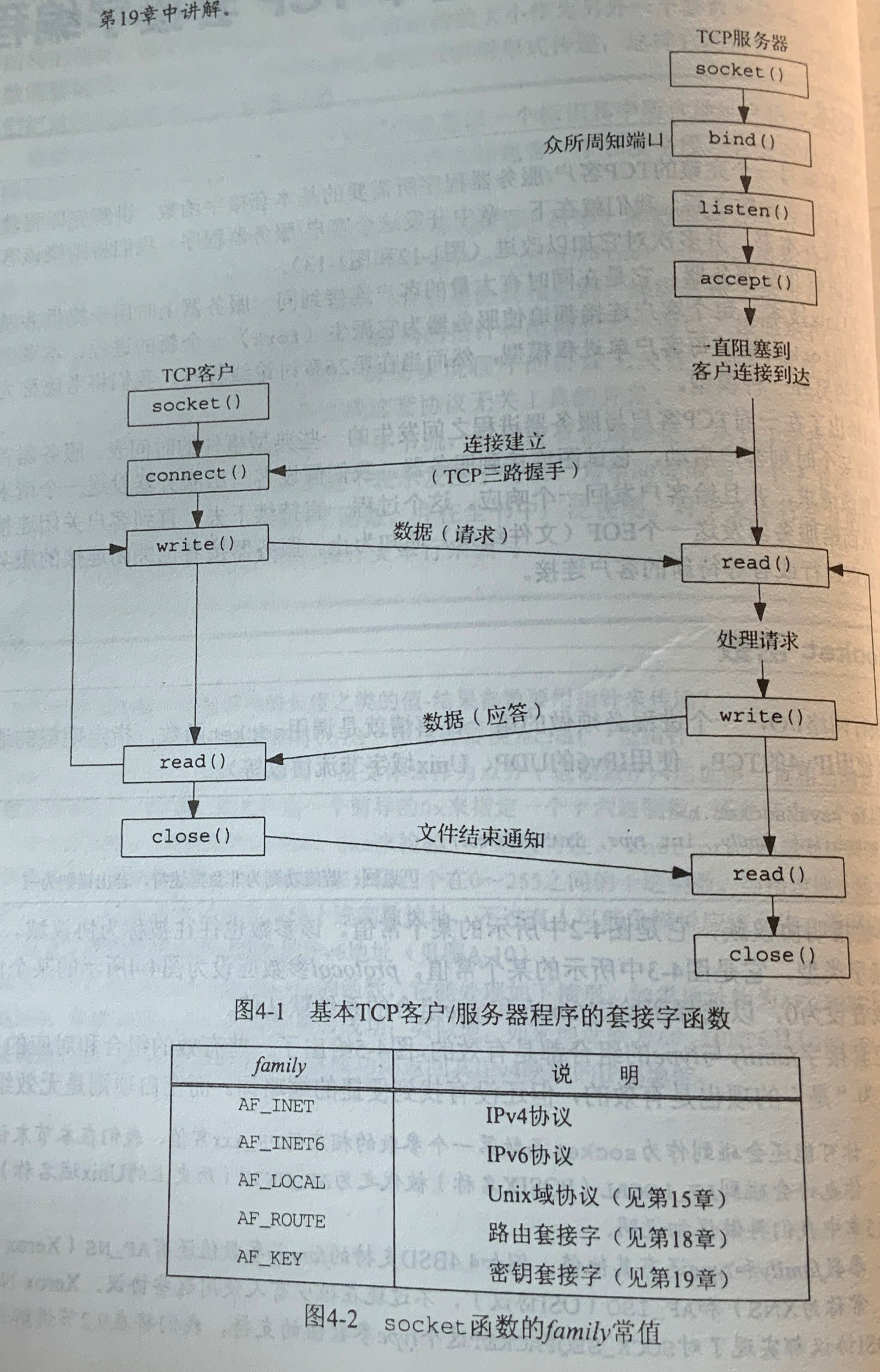

3、bind
int bind(int sockfd, const struct sockaddr *myaddr, socklen_t addrlen);
若成功返回0,否则返回-1。
4、listen
int listen(int sockfd, int backlog);

5、pipe
pipe创建管道,单向数据流。
#include<unistd.h>
int pipe(int fd[2]);
若成功返回0, 否则返回-1。
并返回两个文件描述符fd[0]打开读,fd[1]打开写。
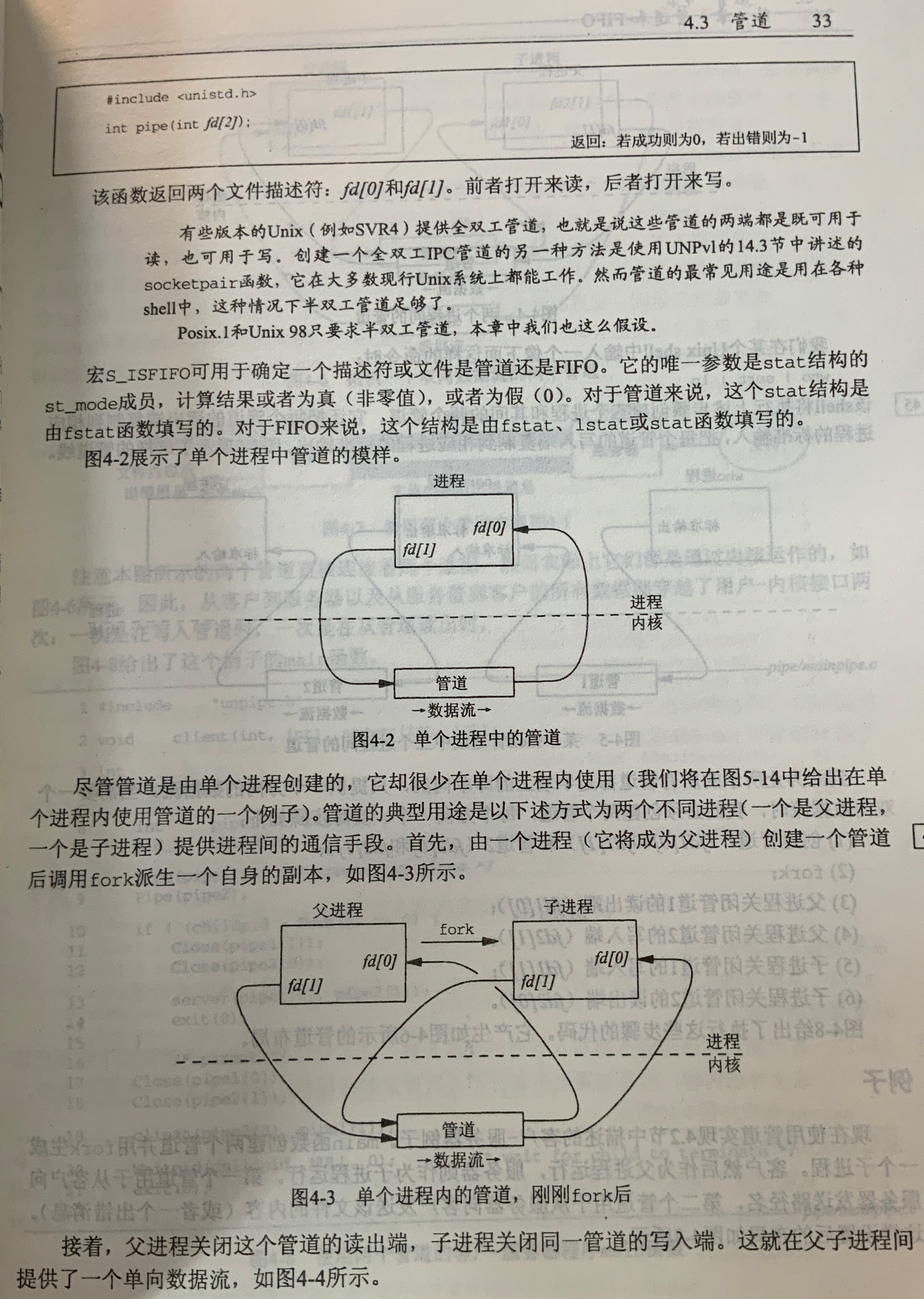
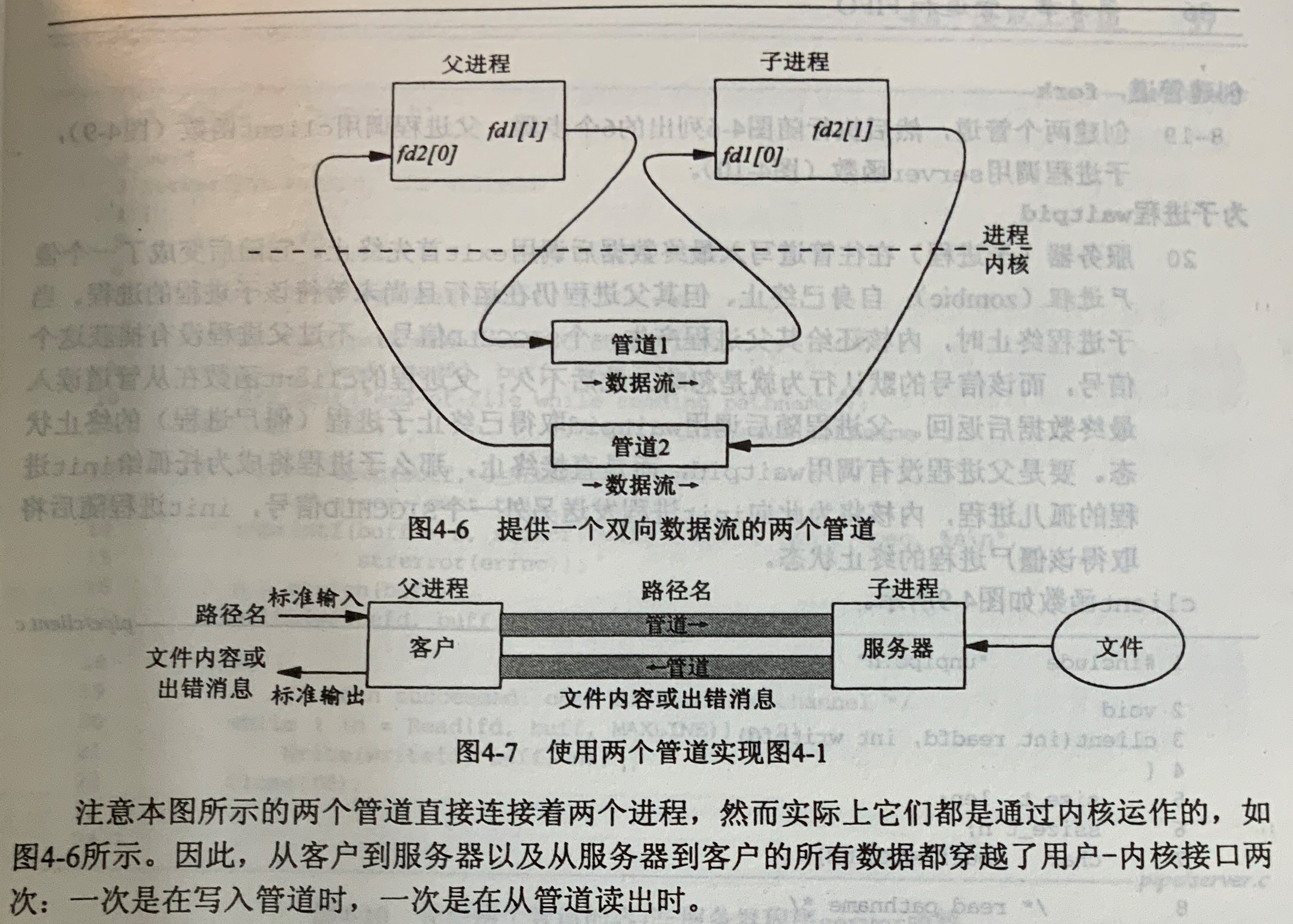
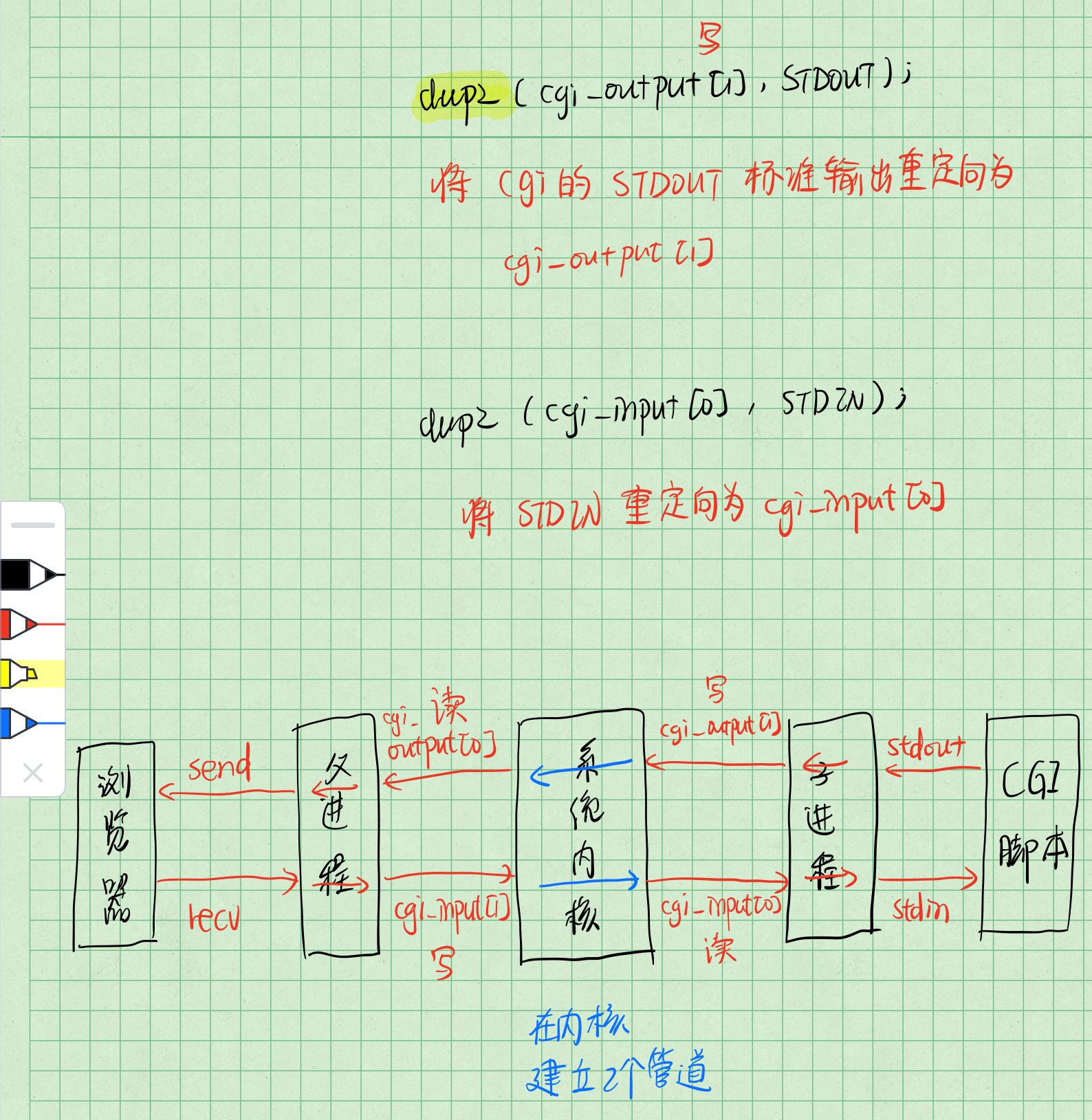
6、fork
#include<unistd.h>
pid_t fork(void);
fork调用一次,返回两次。在父进程返回一次,返回子进程的进程ID号;在子进程返回一次,值为0;出错返回-1。
注意:fork之后管道都复制了一份,因此需要关闭无用端口,避免浪费。
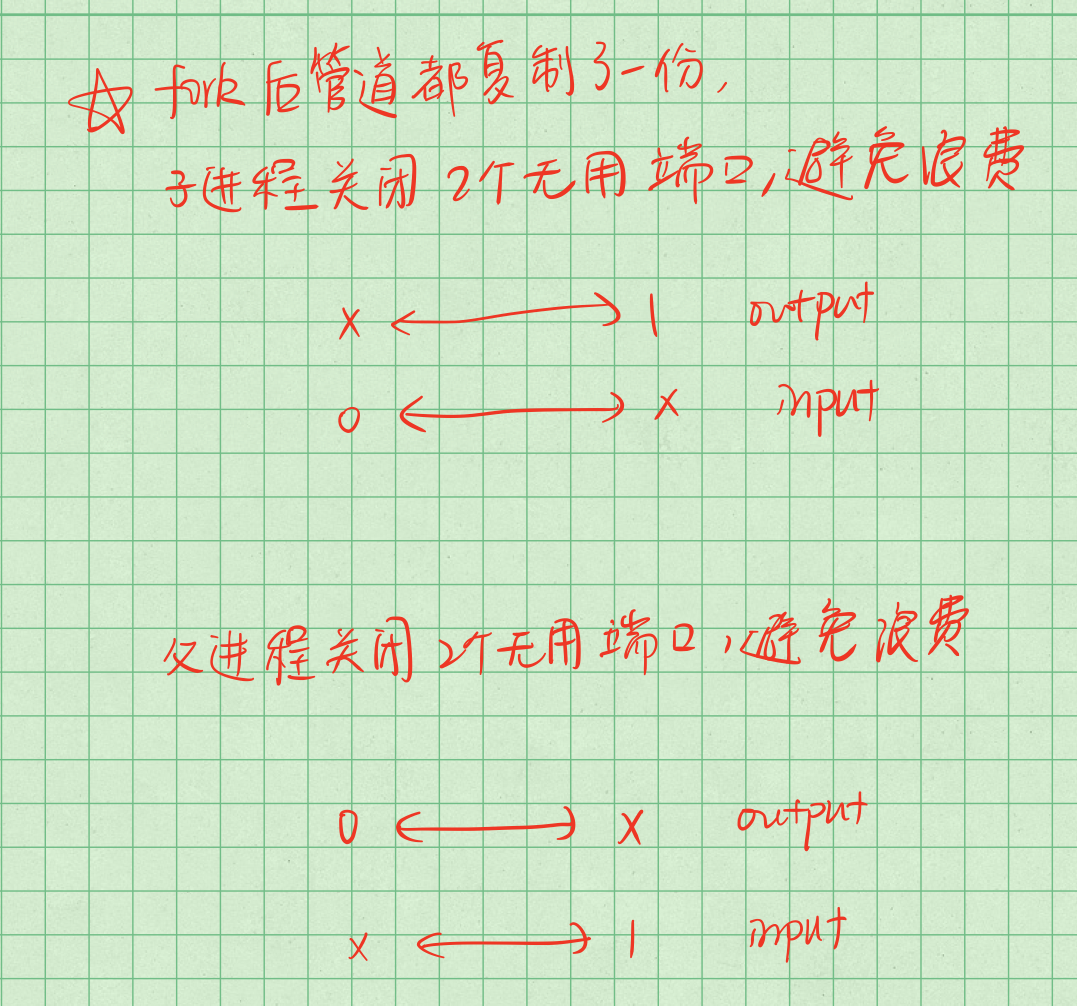
参考书籍:《UNIX网络编程 卷1:套接字联网API》《计算机网络自顶向下方法》
如有错误,请在评论中指出,谢谢!